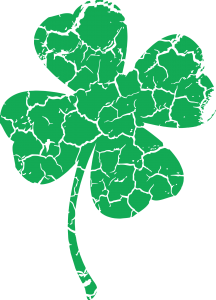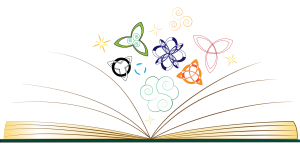When Celtic Fantasy Goes Bad
One night at a party I was introduced to a woman who proudly informed me she’d named her baby daughter ‘Banshee’ in celebration of her Irish heritage. Even at the time I was pretty stunned by this revelation. For an Irish person (and I would have thought most people would have known this), this was the equivalent of naming your daughter ‘Death’.
About two weeks later, at another party (I had a social life back then!), I was cornered by a different woman demanding a translation for the chorus from Clannad’s haunting Theme Song from Harry’s Game. The Irish lyrics for the chorus had been written on her CD sleeve as ‘Fol dol de doh fol-de de day’!) which she thought was absolutely beautiful and must have meant something mystically profound. Needless to say, she wasn’t particularly impressed when I translated it as ‘La, la la la, la la laaah!’
These are just two examples of the cultural disconnect between Irish people and non-Irish people who dabble in Irish mythology. They are however only two of the hundreds I’ve personally experienced over the last twenty years or so and I know many other Irish people who’ve had similar experiences. It’s actually a source of continual bemusement to see how bizarrely and inaccurately our culture’s been represented over that time.
In some respect, Clannad actually bear some responsibility for the situation given that their moody Robin of Sherwood and other music (aided in equal amounts by ‘Celtic’ films such as Excalibur and so on) helped to create this situation. During the 1970s and 1980s, with the explosion of fantasy entertainment through books, comics and movies, stories based on Celtic mythology suddenly became extremely hip. Atmospheric visuals and music from musicians such as Clannad, Enya and others helped to fan the flames to the point where ‘Celtic Mythology Fantasy’ (what some call ‘Celtic Fantasy’) based entertainment is now a major industry.
 Celtic Mythology = ??
Celtic Mythology = ??
Unfortunately, the term ‘Celtic Mythology’ is a bit of a misnomer. The main problem is that the terms ‘Celtic’ or ‘Celt’ don’t actually mean anything (and therefore can mean whatever you want it to mean). Certainly back in early Europe there were populations with similar cultural characteristics that the Romans generically referred to as ‘Celts’ but even amongst those peoples there were substantial cultural differences. In a sense, using the word ‘Celt’ is a bit like using the word ‘European’. Modern-day Europe covers a defined geographical area with populations that have many similar characteristics but, again, the truth is that it’s the differences that define them. A German, for example, wouldn’t primarily identify himself/herself as a European. Neither would a French person. A Welshman wouldn’t identify himself as Irish or vice versa.
Another problem with ‘Celts’ is that the ancient culture referred to as ‘Celtic’ (always by people who didn’t form part of that group) are pretty much gone (eradicated by the Romans or subsequently colonized out of existence) and the records of them are extremely sparse. Hence, most of the time the closest thing (Gaelic records or Welsh records) are used instead. Because of their age, the cultural context in these records is very broadly interpreted and their modern-day expression tends to reflect the particular bias of the people interpreting them.
The Salmon of Ignorance
Several years ago, my family attended a friend’s ‘Celtic’ wedding which turned out to be some strange mix of Revisionist Celt, New Age, Wicca and other influences. It was a great celebration and we were having a lot of fun until the marriage ceremony proper began and the celebrants started praying to the Salmon of Knowledge. At that point, my two kids started cracking up and I was struggling to keep a straight face myself because it was immediately obvious what had happened. In their attempts to ‘Celticise’ the ritual, the celebrants had clearly gone through various ‘Celtic’ books (Gaelic books) and selectively pulled out elements that they could incorporate. Unfortunately, because they were oblivious to the cultural context, what they eventually ended up with made absolutely no sense and the poor old salmon was elevated to some kind of symbolic messenger of the Gods. My daughter told me a few years later that, for her, it was like going to a church as a kid and discovering that everyone was praying to Kermit the Frog.
This is, unfortunately, a common pattern you’ll find in modern fantasy that incorporates Irish mythology. A non-Irish author/film-maker or other creative type will browse through some ‘Celtic’ source book, pluck out a few cultural elements and then rearrange them with other elements to create a narrative that’s subsequently used for commercial entertainment.
Appropriation and Exploitation: Wading in the cultural shallows)
The problem, however, is that mythology is CULTURALLY based. Mythology contains elements of fantasy but at its most fundamental it’s an intellectual framework used by our ancestors to make sense of the world around them. Because it’s culturally based, many of the mythological elements and associated context have been passed down through generations and incorporated into national identity and belief systems. Today of course, the use of Irish mythology has been superseded by scientific rationale, but its core narratives remain intrinsically linked to Ireland’s self-identity and cultural values.

From an Irish perspective therefore, when you see your native cultural icons plucked from their normal environment, repackaged in some pseudo-Celtic bullshit and reproduced out of context in a fantasy product, you can start to appreciate the complaints from other native groups about the commercial appropriation and exploitation of their cultures. For Irish people in particular, it feels as though we’ve been bombarded by mawkish, overly romanticised and culturally inaccurate interpretations of our own mythology for decades.
Even today, if you really want to bug an Irish friend, try showing him or her a copy of Darby O’Gill and The Little People (starring that famed ‘Irish’ actor … Sean Connery) or perhaps a section from the execrable Mystic Knights of Tir Na nÓg’ (a kind of ‘Oirish Transformers’ television series). Alternatively, you could share the ‘Disneyfied’ commercial version of Fionn mac Cumhaill created by the British National Trust Board at the Giants Causeway or read them any number of twee ‘Oirish Fairytales’. The choice is truly endless but some of them are so culturally offensive they should have been put down at birth of concept.
Kickback
Over the last few decades, within all genres, we’ve seen increasing numbers of English-speaking writers explore other ‘exotic’ cultures (and their historical belief systems) as a source of creative inspiration. More recently, however, we’ve also seen increasing kickback from ethnic minorities (and majorities) at the continued misrepresentation of their cultures. This has resulted in an increased use of ‘sensitivity readers’ (and whoever came up with that term needs to have their head examined!) by mainstream publishing companies, although the trend hasn’t really extended to indie publishing.
This situation, I think, reflects a shift in the reading population, in that readers are cottoning onto the fact that some of the ‘cultural’ stories they’re being presented with aren’t exactly authentic. It also reflects increased scrutiny and accountability on authors/publishers who misrepresent other people’s mythology/belief systems. In the fantasy genre, you may recall the recent furore associated with J. K. Rowling’s portrayal of Navajo belief systems in History of Magic in North America, but keep an eye out because you’ll probably be seeing a lot more of this over the years to come.
I don’t believe for a moment that it’s any author’s intention to be offensive when they use mythologies that aren’t their own. In fact, I’d suspect the vast majority of them would be dismayed if they knew their work was somehow considered offensive. Unfortunately, authors write stories based on their own experiences or what they’ve managed to learn and, frankly, sometimes you just don’t know what you don’t know. Different cultures aren’t easily transferable (although if you spend enough time living in them or studying them intensely you can certainly pick up enough to represent them accurately) and this makes wading in the mythological shallows that much more dangerous. This is particularly the case with Irish mythology as there’s so much misinformation already out there (many people, for example, through no fault of their own, still believe W. B. Yeats is a credible authority on Irish mythology!).
Neither do I believe that Irish people have a particular aversion to non-Irish authors writing fantasy based on Irish mythology. That said, it would probably help if those authors acknowledged it and managed to get even some of the basic cultural context correct. Unfortunately, many ‘Celtic Fantasy’ authors don’t, and in some cases their idea of cultural authenticity is to chuck in some Irish names and a smattering of Gaelic – a language they neither speak nor understand, and care even less about getting grammatically correct. Given all of this, it’s no surprise Irish mythological fiction has such a bad name among Irish readers and, consequently, Irish writers.
And this is probably one of the saddest ironies about this situation. If you look up any ‘Irish mythology’ or ‘Irish fantasy’ list on Amazon or elsewhere, you’ll struggle to find a single Irish author (although you’ll find plenty of Paddywhackery). This is because most of those authors are non-Irish authors writing a commercial kind of ‘Oirish’ mythology fiction for American/Canadian/Australian etc. markets – not an Irish one. As a result, you now have a bizarre situation where Irish/Gaelic culture has now become a commercial commodity that the English-speaking creative world feel perfectly entitled to use as it sees fit.
A Tough Call
Watching the recent upsurge in protest publishers and film producers, it’s no real surprise to see parallel occurrences with Irish people increasingly pouring online scorn on fantasy authors/filmmakers who couldn’t be bothered to get the basic facts right or who try to establish themselves as authorities on something they clearly don’t understand. With Irish (and Sottish and Welsh etc.) creators now finally starting to reassume control of their own mythology/cultural heritage, it’s more than likely that clashes between ‘authentic Irish’ and ‘commercial Oirish’ are only going to increase from here on in. This is a shame because, at heart, the issue’s really around how far the argument of ‘creative licence’ allows you to go in terms of misrepresenting someone else’s culture for your own commercial benefit. That’s actually a tough call, as it comes down to an individual’s personal values and judgement. People will always be inspired by aspects of different cultures, and there’s no harm in using those – provided it’s done honestly, i.e. people are up front about what they’re doing and not misrepresenting themselves as authorities on a culture they’ve never lived. Given that there’s no real consensus on this at present, for the next few years you can probably expect to keep encountering young girls called ‘Death’ obliviously wreaking cultural havoc at the far ends of the earth.

[…] right? Not really. Brian O’Sullivan, writing on The Fantasy Hive with a post titled ‘When Celtic Fantasy Goes Bad‘ explains why this is more difficult than it appears. If you’re aware of history, this […]
Love this.